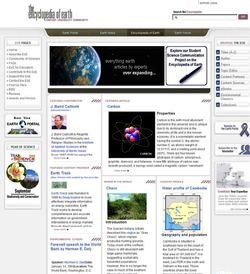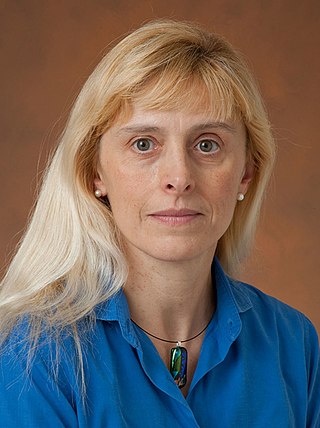
The National Center for Science Education (NCSE) is a not-for-profit membership organization in the United States whose stated mission is to educate the press and the public on the scientific and educational aspects of controversies surrounding the teaching of evolution and climate change, and to provide information and resources to schools, parents, and other citizens working to keep those topics in public school science education. Based in Oakland, California, it claims 4,500 members that include scientists, teachers, clergy, and citizens of varied religious and political affiliations. The Center opposes the teaching of religious views in science classes in America's public schools; it does this through initiatives such as Project Steve. The Center has been called the United States' "leading anti-creationist organization". The Center is affiliated with the American Association for the Advancement of Science.

The General Certificate of Secondary Education (GCSE) is an academic qualification in a particular subject, taken in England, Wales, and Northern Ireland. State schools in Scotland use the Scottish Qualifications Certificate instead. Private schools in Scotland may choose to use GCSEs from England.

Environmental studies is a multidisciplinary academic field which systematically studies human interaction with the environment. Environmental studies connects principles from the physical sciences, commerce/economics, the humanities, and social sciences to address complex contemporary environmental issues. It is a broad field of study that includes the natural environment, the built environment, and the relationship between them. The field encompasses study in basic principles of ecology and environmental science, as well as associated subjects such as ethics, geography, anthropology, policy, education, politics, urban planning, law, economics, philosophy, sociology and social justice, planning, pollution control and natural resource management. There are many Environmental Studies degree programs, including a Master's degree and a Bachelor's degree. Environmental Studies degree programs provide a wide range of skills and analytical tools needed to face the environmental issues of our world head on. Students in Environmental Studies gain the intellectual and methodological tools to understand and address the crucial environmental issues of our time and the impact of individuals, society, and the planet. Environmental education's main goal is to instill in all members of society a pro-environmental thinking and attitude. This will help to create environmental ethics and raise people's awareness of the importance of environmental protection and biodiversity.

The National Science Board (NSB) of the United States establishes the policies of the National Science Foundation (NSF) within the framework of applicable national policies set forth by the President and the Congress. The NSB also serves as an independent policy advisory body to the President and Congress on science and engineering research and education issues. The Board has a statutory obligation to "...render to the President and to the Congress reports on specific, individual policy matters related to science and engineering and education in science engineering, as Congress or the President determines the need for such reports,". All Board members are presidential appointees. NSF's director serves as an ex officio 25th member and is appointed by the President and confirmed by the US Senate.
Stephen P. Hubbell is an American ecologist on the faculty of the University of California, Los Angeles. He is author of the unified neutral theory of biodiversity and biogeography (UNTB), which seeks to explain the diversity and relative abundance of species in ecological communities not by niche differences but by stochastic processes among ecologically equivalent species. Hubbell is also a senior staff scientist at the Smithsonian Tropical Research Institute in Balboa, Panama. He is also well known for tropical forest studies. In 1980, he and Robin B. Foster of the Field Museum in Chicago, launched the first of the 50 hectare forest dynamics studies on Barro Colorado Island in Panama. This plot became the flagship of a global network of large permanent forest dynamics plots, all following identical measurement protocols. This global network now has more than 70 plots in 28 countries, and these plots contain more than 12000 tree species and 7 million individual trees that are tagged, mapped, and monitored long-term for growth, survival and recruitment. The Center for Tropical Forest Science coordinates research across global network of plots through the Smithsonian Tropical Research Institute. The program has expanded into the temperate zone, and is now known as the Forest Global Earth Observatory Network or ForestGEO.

The Encyclopedia of Earth is an electronic reference about the Earth, its natural environments, and their interaction with society. The Encyclopedia is described as a free, fully searchable collection of articles written by scholars, professionals, educators, and other approved experts, who collaborate and review each other's work. The articles are written in non-technical language and are intended to be useful to students, educators, scholars, and professionals, as well as to the general public. The authors, editors, and even copy editors are attributed on the articles with links to biographical pages on those individuals.

James Edwin Darnell Jr. is an American biologist who made significant contributions to RNA processing and cytokine signaling and is author of the cell biology textbook Molecular Cell Biology.

St Wilfrid's Catholic High School is a mixed secondary school and sixth form with academy status located in Featherstone, West Yorkshire, England. It has Vocational specialisms.

G. Brent Dalrymple is an American geologist, author of The Age of the Earth and Ancient Earth, Ancient Skies, and National Medal of Science winner.
St Joseph's Roman Catholic High School and Sports College is a voluntary aided comprehensive school located in Horwich, Greater Manchester, England. It is under trusteeship of the Roman Catholic Diocese of Salford and is maintained by Bolton Metropolitan Borough Council.
Richard Elliot Benedick is President Emeritus of the National Council for Science and the Environment. He is a former ambassador and was chief United States negotiator to the Montreal Protocol on protection of the ozone layer.
The Louisiana Science Education Act, Act 473 (SB733) of 2008 is a controversial anti-evolution law passed by the Louisiana Legislature on June 11, 2008 and signed into law by Governor Bobby Jindal on June 25. The act allows public school teachers to use supplemental materials in the science classroom which are critical of scientific theories such as evolution and global warming and to promote creationism as science. Louisiana was the first state to have passed a law of this type.
The National Council for Science and the Environment (NCSE) is an annual conference that brings together over 1,000 scientific, educational, business, civil society, and government professionals from diverse fields to explore the connections between science and decision-making associated with important environmental issues.
Sunnydown School is a special boarding secondary school situated in the town of Caterham in Surrey, England. Founded in 1949, it is the second oldest special school in Surrey. The school educates students aged 11 to 16.
The International Science Council (ISC) is an international non-governmental organization that unites scientific bodies at various levels across the social and natural sciences. The ISC was formed with its inaugural general assembly on 4 July 2018 by the merger of the former International Council for Science and the International Social Science Council (ISSC), making it one of the largest organisations of this type.
Shelby G. Tilford was an American atmospheric spectroscopist, Earth scientist, and science program administrator. He retired in 1994 after a long career with the National Aeronautics and Space Administration, most recently serving as the Acting Associate Administrator of NASA's Office of Mission to Planet Earth. He is recognized as one of the main initiators of the Earth system science concept and NASA's Mission to Planet Earth program, which represented NASA's contribution to the U.S. Global Change Research Program (USGCRP).

Cinzia Zuffada is an Italian-American engineer who is the Associate Chief Scientist at the Jet Propulsion Laboratory. Her role considers the strategic planning of scientific programs for JPL and the development of reflectometry technologies for Global navigation satellite systems. She is the chair of the Board of the Italian Scientists & Scholars in North America Foundation.








